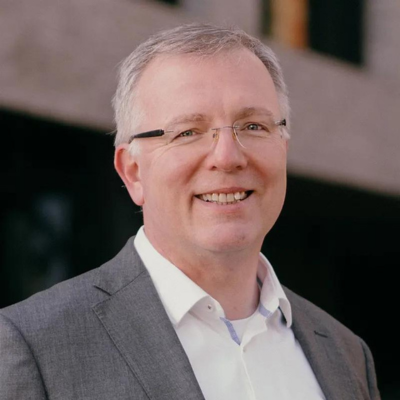

A conference dedicated to sustainable construction for resilient cities 2.0 will take place on 23 May. Shared perspectives on this event with the three organisers (LIST, Luxinnovation and Neobuild).
 Jean-Michel Gaudron
Jean-Michel Gaudron
Following the success of the first edition in July 2023, LIST, Luxinnovation and Neobuild are once again joining forces for a new event dedicated to sustainable construction. It will take place on 23 May at the Neobuild building in Bettembourg.
Industry leaders, innovators, and sustainability enthusiasts will come together to delve into the pressing environmental issues facing construction in Luxembourg today.
Keynote speakers and a panel discussion in the morning will facilitate exchanges on best practices and challenges ahead. Afternoon workshops will focus on specific challenges such as waste heat, water reuse, and resource circularity and logistics on construction sites.
We met with Perla El Boueiz (Partnership Officer Construction at LIST), Charles-Albert Florentin (Manager – CleanTech Cluster at Luxinnovation), and Luc Meyer (Technical Engineer – Director at Neobuild) to outline the key aspects of this event.
Perla El Boueiz (LIST): "The challenge is to minimise environmental impact while ensuring the social and economic sustainability of buildings. This involves using ecological materials, efficient resource management, and a design focused on energy efficiency and well-being."
Luc Meyer (Neobuild): "It is multifaceted. On the one hand, we can discuss 'construction' in terms of processes (digitalisation/automation/digitisation/off-site (DFMA-D)), and on the other hand, 'sustainability' at the level of the built environment itself (circularity, geosourced and biosourced materials, healthy and smart buildings, sustainable techniques/technologies, carbon footprint, and waste management/recovery)."
Charles-Albert Florentin (Luxinnovation): "Achieving more sustainable construction involves, in my opinion, optimising energy consumption throughout the life of a project and intelligently using available raw materials. This is to ensure better long-term environmental, economic, and social outcomes."
P. E. B.: "Innovation is a crucial driver for the evolution of the construction sector. Its integration into professional expertise accelerates and achieves the holistic transformation of the sector on several fronts: decarbonising traditional industries, developing eco-responsible materials, implementing BIM (Building Information Modeling) process, integrating renewable energy solutions, and optimising resource management, etc."
C.-A. F.: "Systematically encouraging the use of existing tools for eco-friendly building designs, improving traceability and user experience before construction, streamlining the production of building components, preferably using local, healthy, and reused materials, optimising site management, ensuring intelligent building maintenance and renovation, and finally choosing selective deconstruction."
L. M.: "The most important thing is 'leading by example': showing that it is possible and achievable. It is also necessary to find a new balance by clearly managing objectives and challenges by project typology."
 Perla El Boueiz: "According to Eurostat, Luxembourg produces three times more waste per year than the European average per capita, with 80% of this waste coming from the construction sector. The material circularity rate is also three times lower than the European level.
Perla El Boueiz: "According to Eurostat, Luxembourg produces three times more waste per year than the European average per capita, with 80% of this waste coming from the construction sector. The material circularity rate is also three times lower than the European level.
Regarding logistics, it is often an underestimated or late-stage consideration in construction, yet available data shows it represents 10% to 20% of construction costs.
The European project SUCCESS, coordinated by LIST, has demonstrated the economic and environmental relevance of shared logistics. It is now time to step up with the establishment of Construction Consolidation Centres (CCC) as in London, Brussels, Stockholm, Paris, Lyon... to enable efficient and circular management of construction materials."
P. E. B.: "Support guides for developing material inventories and assistance with deconstruction have been developed by LIST in collaboration with the Ministry of the Environment to raise awareness and assist both public and private stakeholders.
To convince stakeholders in sectors such as construction, it is essential to demonstrate the positive impact of innovation in real projects. LIST has conducted three pilot cases of shared logistics in Luxembourg with our partners CLE, CFL Logistics, and Polygone.
Delivering necessary materials to the right place at the right time has reduced the number of site deliveries by a factor of 3 while reducing construction costs by 5%, thanks to a productivity increase of over 15%.
To disseminate these results across the sector, we have developed the digital tool TwiSCO, which anticipates delivery constraints on-site and optimises deliveries. Finally, to drive change, public decision-makers have an important role to play."
To drive change, public decision-makers have an important role to play. Perla El Boueiz (LIST)
 Luc Meyer: "Reuse is a sensitive issue, with few initiatives existing but limited to greywater reuse. Various legislations remain quite timid on the subject nationally."
Luc Meyer: "Reuse is a sensitive issue, with few initiatives existing but limited to greywater reuse. Various legislations remain quite timid on the subject nationally."The most important thing is 'leading by example': showing that it is possible and achievable. Luc Meyer (Neobuild)
 Charles-Albert Florentin: "The revised 2023 European Energy Efficiency Directive (EED) addresses the issue of waste heat recovery and introduces energy efficiency obligation schemes (EEOS).
Charles-Albert Florentin: "The revised 2023 European Energy Efficiency Directive (EED) addresses the issue of waste heat recovery and introduces energy efficiency obligation schemes (EEOS).it is necessary to think ahead rather than compensate, Charles-Albert Florentin (Luxinnovation)